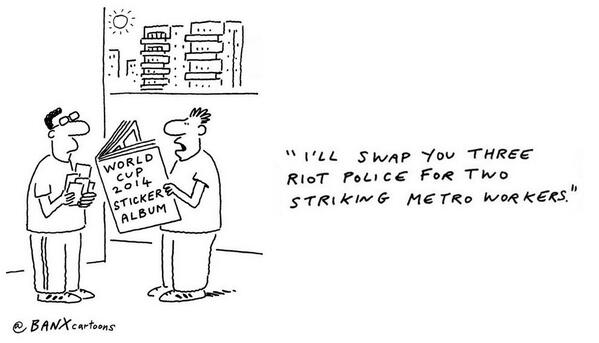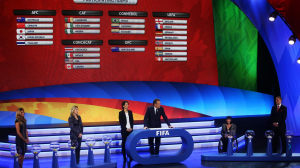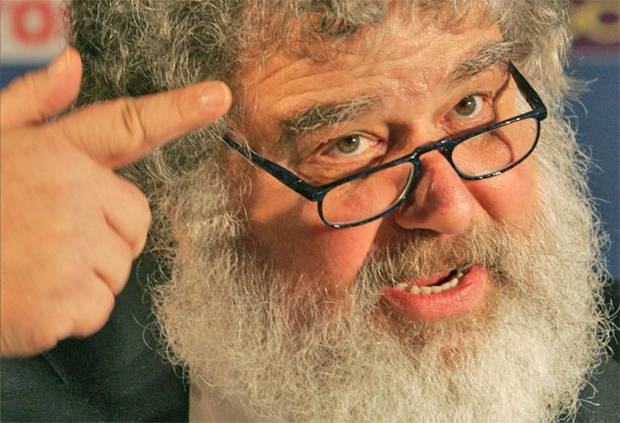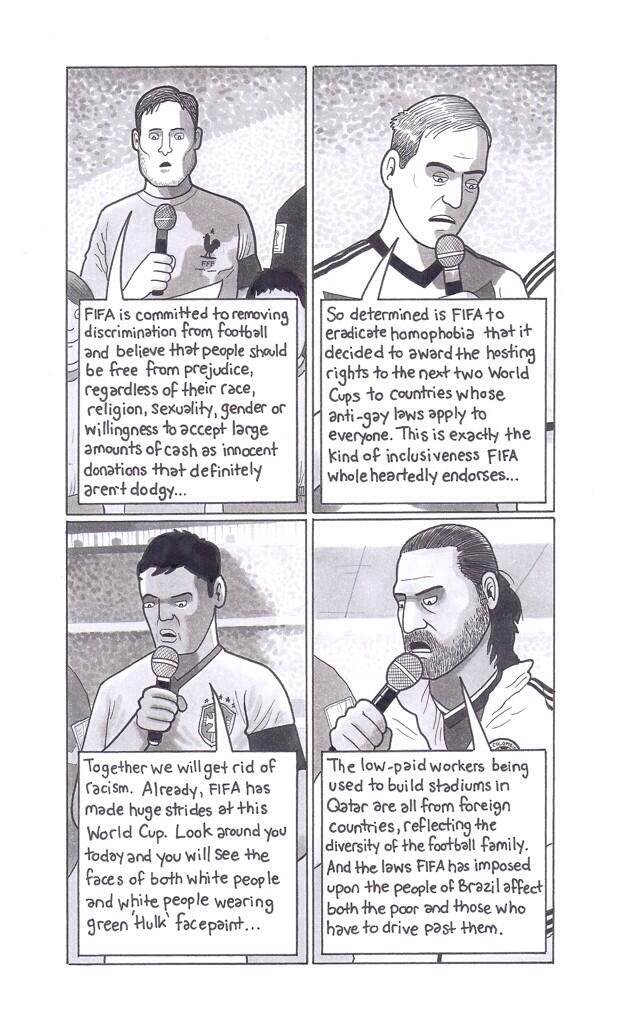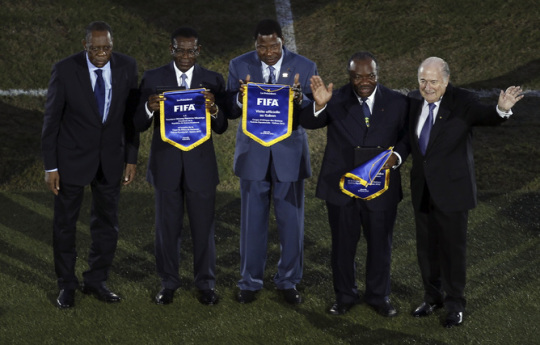
On Tuesday, June 2, Sepp Blatter announced his intention to resign as FIFA president just four days after winning reelection to a fifth term — an electoral victory that simply could not have happened without the support of FIFA’s African members.
According to unofficial calculations, the 133 votes secretly cast for Blatter came from Africa (53), Asia (46), and North America (minus the United States) and the Caribbean (34).
Why did Africans unanimously support the leader of a troubled, even loathed, organization which two days earlier witnessed the arrest of seven of its executives in Zurich on US bribery and corruption charges?
As an academic who has been researching, publishing and teaching the history and culture of African football for two decades, I want to offer a possible answer to this challenging question.
Read full text here at The Conversation.
Tag: FIFA
Blatteropoly: The ESPN Documentary
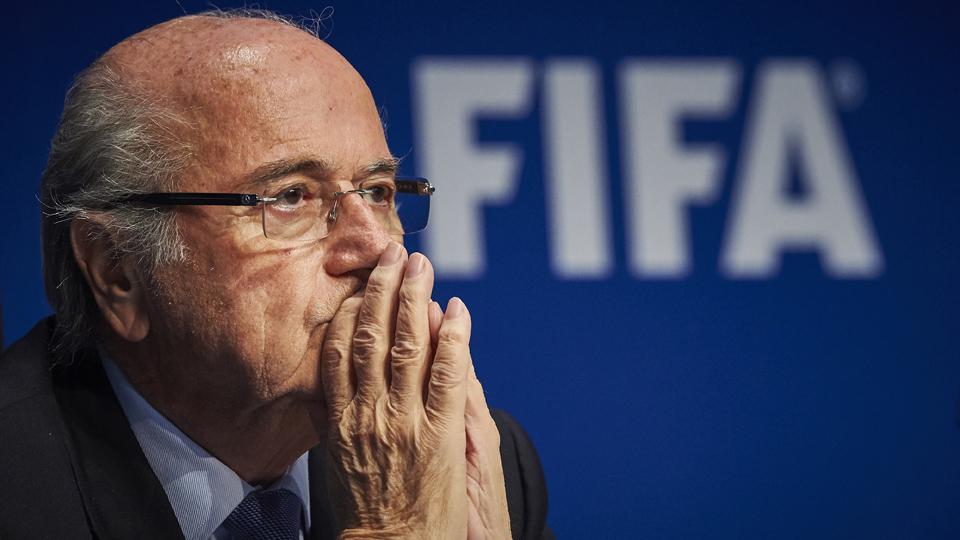
Exquisitely timed for release just ahead of the May 29th FIFA presidential election, ESPN aired an excellent E60 documentary on Sepp Blatter’s governance of world football.
Jeremy Schaap’s piercing investigation deftly uses on-camera interviews with whistleblower Phaedra Almajid, ex-FIFA men like Guido Tognoni, Swiss government officials, and others to probe the murky bid process that granted Qatar hosting rights to the 2022 World Cup. The story digs vigorously into a culture of corruption, fear, intimidation, patronage, and politricks within football’s world body.
Watch the entire show by clicking on each link below:
Part 1: Blatter’s power and Qatar’s World Cup
Part 2: Beginnings of the legend of Blatter
Part 3: Controversy surrounds Blatter’s reign at FIFA
Part 4: Criticism in the UK
Part 5: Challenging Blatter’s power
As an after-viewing treat, I would highly recommend listening to this interview by Sports Illustrated’s Grant Wahl with Jeremy Schaap about making the documentary, lessons learned, and a lot more.
And if you still haven’t had enough, then go ahead and enjoy Last Week Tonight‘s John Oliver lambast the most powerful man in sports! (click here to watch).
The Women’s Game: Global Perspectives
Last Saturday’s 2015 Women’s World Cup draw in Ottawa briefly took the global media spotlight away from the men’s game. And from the players’ gender discrimination lawsuit against FIFA and the Canadian Soccer Association for staging matches on artificial turf rather than natural grass.
The prominence of the women’s game in the sport-media-industrial complex happens so rarely, and tends to be so fleeting, that the Football Scholars Forum, the online fútbol think tank based at Michigan State University, decided to devote its final event before the holiday break to a thorough discussion of the state of the women’s game internationally, both on the pitch and in the scholarly literature.
This veritable intellectual pelada (pickup game) takes place on Thursday, December 11, at 2pm Eastern U.S. Time (-5 GMT). To jumpstart the Skype discussion, eminent scholars of the game have written pre-circulated blog posts on the FSF website.
Click here to read “When Two Elephants Fight, It is the Grass That Suffers” by Jean Williams (DeMontfort University, @JeanMWilliams).
Click here to read “Marimachos: On Women’s Football in Latin America” by Brenda Elsey (Hofstra University, @politicultura) and Joshua Nadel (North Carolina Central University, @jhnadel).
Click here to read “The National Teams We Know Nothing About” by Gwen Oxenham.
Click here to read “A Pitch of Her Own” by Martha Saavedra (@tricontinental)
This is not the first time that FSF has delved into aspects of the study and play of women’s football. In 2011, just before the last Women’s World Cup, Cynthia Pelak and Jennifer Doyle facilitated a vigorous session (click here for details and audio). A second gathering a year later pivoted around Jun Stinson’s short documentary film, The 90th Minute (click here to listen to my interview with the filmmaker), and featured an intervention by Gwen Oxenham, author of Finding the Game (click here for audio).
To participate in the December 11 FSF event via Skype, please contact Alex Galarza on Twitter (@galarzaalex) or by email at galarza.alex AT gmail. See you on the virtual pitch!
For a quarter century Chuck Blazer was the most powerful soccer administrator in the United States and CONCACAF. He was a member of the FIFA Executive Committee from 1996 to 2013. Investigative journalist Andrew Jennings revealed in 2011 that Blazer was under FBI investigation for tax evasion. Thanks to a devastating, detailed report by The New York Daily News published this weekend, we now also know that Blazer became an FBI informant. (Click here for full text.)
In doing so, U.S. authorities sought to gain “a rare window into the shadowy financing of international soccer, a world notorious for its corruption and lavish excess,” the Daily News reports.
Blazer’s debauchery is legendary, as this blog has highlighted in the past. But the Daily News presented new evidence documenting how he “failed to pay income taxes for more than a decade while hauling in tens of millions of dollars, a discovery the feds used to threaten him with prosecution and convert him into a cooperating witness.” The newspaper provides fresh evidence of Blazer’s misallocation of funds and misuse of assets belonging to CONCACAF. He went so far as to run up $29 million in credit card charges. Damning proof, it is alleged, that Blazer was “intoxicated by power and cash.”
The 69-year-old soccer official, now dying of colon cancer, “lived like there was no tomorrow,” emboldened by global football administration’s modus operandi—one that makes “you feel like you’re the king of the world,” one source told the Daily News; “And it’s all for soccer.”
***
Addendum (11/6/2014): Listen to “Beyond The Pitch” podcast “dissect and tell the story behind the tale that is titled Mister Ten Percent, Chuck Blazer, a lengthy piece that digs deep into his background and explains how a soccer dad from New York rose to the dizzying heights of world football royalty, how he climbed the ladder armed with ambition and ingenuity and what led to his fall as fresh reports in New York media suggest that he is now cooperating with federal authorities.”
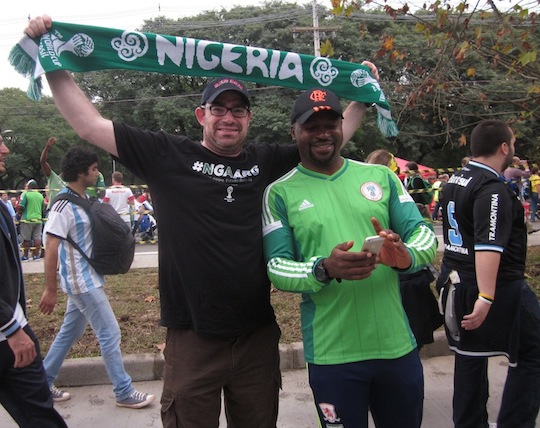
Guest Post by *Derek Charles Catsam
I recently returned from the 2014 World Cup in Brazil. It was a remarkable experience in a beautiful country. Everywhere we went people were gracious, joyful hosts. We ate fantastic churrasqueira (the Brazilian barbecue that will fuel my dreams for months) and drank among friends. The games were tremendous, the colorful visiting fans (with special mention to the dancing, chanting, singing, drinking Argentine throngs) made the World Cup the event that it is. The protests were more intermittent than expected. But the issues raised were as valid as ever.
I was based in Porto Alegre in the state of Rio Grande do Sul on Brazil’s southern border with Uruguay and Argentina. I attended four matches in Estadio Beria-Rio, the home of Sports Club Internacional: France-Honduras, Algeria-South Korea, Argentina-Nigeria, and the round of 16 match pitting eventual champions Germany against the Algeria. With 32 teams competing, the first two weeks of the World Cup are an unparalleled Carnival of Nations. Porto Alegre was in the midst of a Brazilian winter, hardly freezing, but occasionally raw and damp. The bikinis and swimming shorts that many of you saw as the regular going-to-commercial interludes on ESPN were many hundreds of miles north.
The tournament, which equaled the most goals (171) ever scored in a World Cup, was spectacularly entertaining and Germany is certainly a worthy champion. But once the confetti cleared, the last drinks were downed, tourists returned home, and Brazilians shook off the shameful way the Seleção flamed out of the tournament (and I do not for one second believe that the presence of Thiago Silva and Neymar against Germany and the Netherlands would have made much difference—Brazil’s problems were systemic) a familiar question looms: Was hosting the World Cup worth it?
Brazil 2014: World Cup Politics
The day before the magic kingdom opens in São Paulo, WKAR’s “Current State” host Mark Bashore interviewed me about the politics of the World Cup. We discussed FIFA profits and institutional reform, special World Cup laws and extraterritoriality, nation-building, development, civic protests, and what the future holds for Brazil, on and off the pitch. Originally broadcast live on June 11, 2014. Take a listen!
